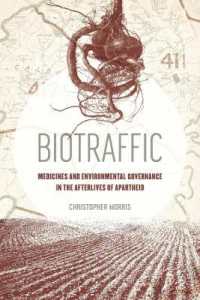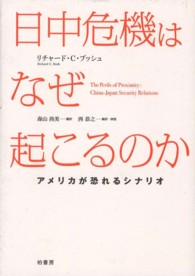- ホーム
- > 洋書
- > 英文書
- > Politics / International Relations
Full Description
The Comprehensive Peace Agreement marked the end of Sudan's second civil war between the North and South. But in creating an autonomous southern region and a pathway toward statehood, it failed to resolve the effects of rebel factionalism, party infighting, and corruption in the South.
In South Sudan's Fateful Struggle, Steven C. Roach analyzes these persistent effects of the South-South war, showing how they disrupted the transition to statehood and divided the transitional government of national unity in South Sudan. Throughout, he stresses the centrality of elite mismanagement and the durable dynamics of war which have shaped the country's troubled political destiny. The government, plagued by patronage-fueled corruption and patrimonialism, continues to rely on the threat of violence to govern the country and to delay the transition to a new government of national unity. Roach argues that in naturally sowing division and distrust, government elites must ultimately learn to engage civil society to achieve long-term peace, accountability, and justice. Along with providing an overview of the country's trajectory in this century, Roach traces its state of war to colonial times and uses the notion of militarized patronage to describe the distinct nature of South Sudan's patronage networks. He shows how the Sudan People's Liberation Movement came to dominate the country's affairs to become a powerful deterrent to democracy, security, justice, and national unity. He then discusses the promising efforts by civil society actors to advance hybrid justice by pressuring the government to implement a truth commission, a war crimes court, and reparations commission.
Comprehensive in scope, the book represents the first systematic examination of South Sudan's quandary both before and after its civil war.
Contents
Preface
Introduction Building Peace in a State of War
Chapter 1: Slave Soldiers, British Colonial Rule, and Armed Resistance
Chapter 2: A Divided Movement and a Framework for Peace
Chapter 3: The Troubled Transition
Chapter 4: Kleptocracy and its Warring Contents
Chapter 5: Impunity, Human Rights, and the Struggle for Justice
Chapter 6: A Revitalized Peace Agreement
Chapter 7: A Transitional Government and the Prospects for Peace and National Unity
Notes
Index







